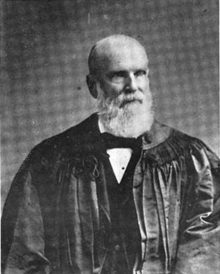Charles H. Simonton
| Charles Henry Simonton | |
|---|---|
 |
|
| Judge of the United States District Court for the District of South Carolina | |
|
In office January 13, 1887 – December 28, 1893 |
|
| Appointed by | Grover Cleveland |
| Preceded by | George Seabrook Bryan |
| Succeeded by | William H. Brawley |
| Judge of the Fourth Circuit Court of Appeals | |
|
In office December 19, 1893 – April 25, 1904 |
|
| Appointed by | Grover Cleveland |
| Preceded by | Hugh Lennox Bond |
| Personal details | |
| Born | July 11, 1829 Charleston, South Carolina |
| Died | April 25, 1904 (aged 74) Flat Rock, North Carolina |
| Spouse(s) | Ella Worth Glover |
| Alma mater | University of South Carolina |
Charles Henry Simonton (July 11, 1829 – April 25, 1904) was a United States federal judge.
Simonton was born in Charleston, South Carolina. He was the son of Charles S. Simonton and Elizabeth Ross. He attended Charleston College for about one year and entered the South Carolina College in October 1846 and graduated in 1849, and read law in 1851. He was in private practice of law in Charleston, South Carolina from 1851 to 1886. He also served as assistant clerk to the South Carolina House of Representatives from 1851 to 1852, and became a member of the state house in 1858. He represented his district there until 1862, then from 1865 to 1866, and finally from 1877 to 1886.
In December 1860, when South Carolina seceded from the Union, Charles Simonton was captain in a volunteer militia company known as the Washington Light Infantry (WLI). The WLI was directed to take possession of the United States arsenal in Charleston. He, with this company, served in Castle Pinckney and in camp on Morris Island, at Secessionville on James Island and on Sullivans Island until the surrender of Fort Sumter. in 1862 the Twenty-fifth Regiment of South Carolina Volunteers of the Confederate States Army was formed. Captain Charles H. Simonton was elected colonel. His regiment served chiefly on James Island, guarding Charleston harbor and approaches to the city of Charleston. In 1865 the Twenty-fifth Regiment, as part of Hagood's Brigade, was ordered to the defenses south of Wilmington, NC on the Cape Fear River, where a part of Hagood's Brigade under Colonel Simonton, acting as a rear guard of the brigade, was outflanked, overpowered by a superior force, and captured. Colonel Simonton was confined in Fort Delaware until after the surrender of the Confederate Army. He was released on July 24, 1865 on order of President Andrew Johnson signed July 21, 1865.
Simonton was a federal judge to the United States District Court for the District of South Carolina. Simonton received a recess appointment from President Grover Cleveland on September 3, 1886, to a seat vacated by George Seabrook Bryan. He was then nominated on December 9, 1886, was confirmed by the United States Senate on January 13, 1887, and received his commission the same day. In 1896 Simonton authored "The Federal Courts: Their Organization, Jurisdiction and Procedure. Lectures Before The Richmond Law School, Richmond College, Virginia." Throughout his time on the federal bench, Judge Simonton lived in the Sword Gate House at 32 Legare Street in Charleston, South Carolina.
...
Wikipedia
